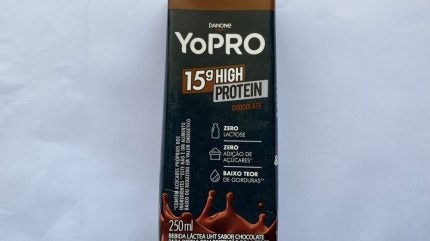
Danone has relocated part of its production of YoPro drinkable high-protein yogurts to a plant in Bucharest, Romania.
The Tetra Pak format of the YoPro drinks is now being manufactured there for markets in central and eastern Europe, the Actimel producer confirmed. These countries include Romania, Bulgaria, Hungary and Slovakia.

Discover B2B Marketing That Performs
Combine business intelligence and editorial excellence to reach engaged professionals across 36 leading media platforms.
Danone told Just Food the move had taken place “as a matter of efficiency”.
The remainder of the company’s YoPro range, which features protein yogurt pots and drinkable protein yogurts in recyclable plastic bottles, will still be made at its facilities in Aldaya in Spain and in Bierun, Poland, the company added.
Danone’s Bucharest factory is its sole production site in Romania. It is dedicated to dairy products. Sixty per cent of the factory’s output is sold in Romania and 30% is exported to 14 European countries.
The site employs 150 people and has an average production capacity ranging between 56,000 and 65,000 tonnes per year. Some 400 people work for the company in Romania in total.

US Tariffs are shifting - will you react or anticipate?
Don’t let policy changes catch you off guard. Stay proactive with real-time data and expert analysis.
By GlobalDataLast week, the French food and beverages major announced plans to remove the Nutri-Score label from its dairy and plant-based drinks sold in Europe.
The company was one of the first to voluntarily commit to the labels but said it was unhappy with the revisions made to the initiative, which mean dairy beverages are placed in the same category as soft drinks.
The Alpro brand owner had been using the Nutri-Score label on its dairy products in France, Belgium, Spain and Germany.
Set up in France in 2017, the Nutri-Score is a colour-coded labelling system that intends to guide customers on the nutritional value of food and drinks, rating products on an alphabetical scale of A to E.
The initiative has proved unpopular with some European countries, such as Italy, which has claimed in the past that the label could mislead consumers.



